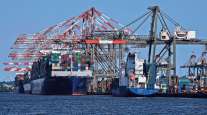Senior Reporter
Ports Say Business Beginning to Recover

[Stay on top of transportation news: Get TTNews in your inbox.]
The nation’s ports are seeing some improvement in business, compared with spring, even as the U.S. economy continues to struggle amid the COVID-19 pandemic.
The uptick comes as officials at three California ports — Los Angeles, Long Beach and Oakland — report operations at their facilities have been spared by the wildfires, which have killed several people and destroyed thousands of acres of land.
“There’s been no impact on our operations,” Port of Oakland spokesman Mike Zampa told Transport Topics.
The Port of Oakland saw a 33.4% increase in units processed in July as workers moved 291,082 twenty-foot equivalent unit containers (TEUs), compared with 218,191 a year earlier.
Meanwhile, the Port of Long Beach said July was the busiest month in its 109-year history. Workers processed 753,081 TEUs, a 21% increase from 621,781 units moved in July 2019.

Cordero
“Supply chain workers at the Port of Long Beach expertly handled a welcome surge in cargo that was brought on due to pent-up demand by consumers,” said Mario Cordero, executive director of the port. “It was a good month, a bright spot, in the midst of the devastating effects of the coronavirus on the economy.”
At the nation’s busiest facility, the Port of Los Angeles, results for July proved to be the strongest of the year, even though the 856,389 TEUs processed was a 6.1% decline year-over-year from 912,154.
“Fewer canceled sailings and 11 additional ‘ad hoc,’ or unscheduled, ship calls helped drive both imports and exports higher than recent months,” said Gene Seroka, executive director of the Port of Los Angeles. “Preliminary data for August indicates solid volumes as retailers continue restocking inventories and preparing for the year-end holiday season.”
IHS Markit transportation economist Paul Bingham said many shippers are getting products into the supply chain now in anticipation of the holiday shopping season.

Bingham
“This is classic peak season behavior,” he said. “Some of the numbers we are seeing are a pent-up demand from the shutdown in the spring and the recovery from the lower numbers earlier in the year.”
However, the Northwest Seaport Alliance, which manages operations at the ports of Seattle and Takoma, Wash., reports its TEU volumes fell 17.2% in July to 270,388 containers compared with 326,515 in July 2019.
“The global pandemic and the trade war between the U.S. and China have unleashed unprecedented impacts to our gateway,” CEO John Wolfe said.
On the East Coast, the Port of Virginia reported its July TEUs dropped 16.7% year-over-year to 221,028 from 265,559 in 2019 — but rose 5% or 10,359 containers when measured against June.

Reinhart
“We are beginning to see some stabilization in volumes, and we expect this to hold for the next two months or so,” Port CEO John Reinhart said.
Georgia’s Port of Savannah reported container volumes declined 6.8% in July to 360,697 compared with 387,022 last July. Officials were optimistic, however, because exports represented 12.2% of goods shipped to other countries. Among top commodities exported were raw cotton (up 61%), wood pulp (up 15.8%) and kaolin clay (up 23.7%).
The Port of Charleston said it moved 176,974 containers in July compared with 210,542 in the same month a year ago. Even with the 18.9% decline, officials said there are signs of a recovery. “A more substantial recovery is dependent on the duration and intensity of the economic impacts from the pandemic, and ultimately, on a vaccine. We are hopeful for a stronger rebound throughout fiscal-year 2021,” CEO Jim Newsome said.

Natural gas and propane join electric power as alternatives to diesel. Host Seth Clevenger talks with Chad Lindholm of Clean Energy and Stuart Weidie of Alliance Autogas. Hear a snippet, above, and get the full program by going to RoadSigns.TTNews.com.
In the Gulf of Mexico, Houston’s port reported a 7.5% decline in July, processing 251,448 TEUs, compared with 234,737 in 2019. Its August results could take a significant blow from the effects of Hurricane Laura.
The Port of Baltimore reported a 20.9% decline in TEUs in July to 77,905 containers compared with 98,539 a year ago. However, officials expect an uptick in cargo. They said European grocery store chain Aldi is expanding business at the port, along with Rite Aid, Big Lots, Tractor Supply Co., and Restoration Hardware among the companies announcing that they plan to increase their business at the Maryland facility.
The Port Authority of New York and New Jersey did not have July numbers at press time.
Want more news? Listen to today's daily briefing:
Subscribe: Apple Podcasts | Spotify | Amazon Alexa | Google Assistant | More




